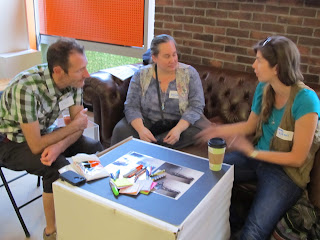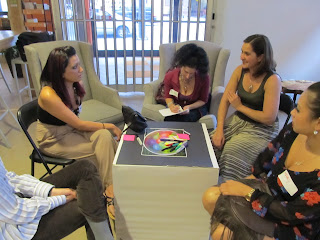Does language shape our relationship with water, or does our relationship with water influence our language?
A risky topic, that typically throws people off guard (discourse? talking about how we talk?), resulted in an intimate but passionate group of people gathering at the Waterlution Toronto Hub to de-construct the language we use around water.
 |
| Collective response of guests about what they would like to see change in the language we use around water |
Some interesting insights were shared from a branding perspective, on segmenting and understanding our audiences, thanks to the exercise facilitated by brand strategist and corporate leadership development coach Mary Jane Braide.
 |
| What we wanted less of, and more of in our discourse around water |
 |
| Who are the audiences that matter? |
 |
| How can we segment and understand them? |
 |
| What value proposition would resonate most with them? |
Contributions from science fiction author Karen Lefave took us on a journey of what kind of language will be used in the future after we have destroyed our earth's lifeblood (triggered a lot of goosebumps).
We all participated in an exercise based on the Appreciative Inquiry Process.
Appreciative Inquiry focuses on taking the best from what 'currently is' and overlaying it on what we think 'ought to be'. The process entails 4 elements:
Discover
Dream
Design
Deliver
To end our evening, we all contributed to a "commons" exercise with Paul Baines, providing prompt questions that he can use on his bike tour journey around the Great Lakes. He will be collecting stories from people he encounters on their awareness of our precious blue resource's value and their future vision of the Great Lakes. You can find us on The Great Lakes Commons Map.

Thanks to everyone who joined us and who shared their valuable ideas- to begin the process of change, we need to take a step back- de-construct - and then consciously reconstruct our discourse around what is the beating heart, the blood, veins and tears of the earth.
Thank you James Watson from SPRiNG for co-hosting.
Feel free to continue the conversation below.








No comments:
Post a Comment